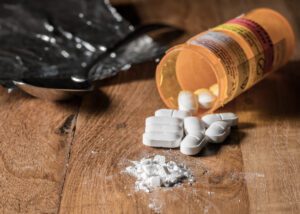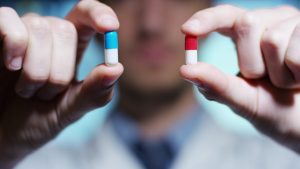
The Ministry of Health continues working on the National Drug Policy Strategy and will soon submit it to the central authorities for approval, Deputy Health Minister Ihor Ivaschenko said during a press briefing in Kyiv on Monday.
“The Ministry of Health continues working on the National Drug Policy Strategy until 2030. The Strategy provides for the continuation of the actions that were in the strategy until 2020 and are aimed at reducing the demand for psychoactive substances, reducing the illicit trafficking of psychoactive substances, drugs, precursors, etc,” he said.
According to Ivaschenko, within the framework of the strategy, four strategic goals were formulated:
– promoting a healthy lifestyle, promoting public health and reducing the demand for psychoactive substances;
– reduction of illegal traffic and seizure of psychoactive substances;
– providing the population with the necessary narcotic drugs;
– development of preventive, diagnostic, medical and socio-psychological institutions to support patients with mental disorders or behavioral disorders due to the use of psychoactive substances.

Biopharmaceutical company Biopharma (Kyiv) has started the production a hyperimmune globulin drug, potentially effective against coronavirus (COVID-19) disease, the drug is to be produced at the end of February.
The first fusion of plasma with antibodies against COVID-19 in the amount of 2,100 liters took place on January 25, the company said in a press release.
“The product will be supplied to the finished goods warehouse at the end of February. Further, the drug is tested in an independent French laboratory, which in March must confirm the antiviral activity of the drug,” the press release said.
The company said that in case of a positive conclusion of the European laboratory, Biopharma will be able to start clinical trials of the drugs in Ukraine.
The collection of plasma with antibodies against COVID-19 started in the spring of 2020 in cooperation with the CoVIg-19 Plasma Alliance, of which Biopharma is a member. The goal of the alliance is to accelerate the development and provide reliable and sustainable treatment for people with complex coronavirus disease.
In October 2020, within the framework of the alliance, the third phase of a clinical trial of inpatient treatment with anti-coronavirus immunoglobulin started.
The results of clinical trials are planned to be published in April 2021. If the trials are successful, the new treatment could provide hope for those suffering from serious health consequences from COVID-19.
“To date, thanks to caring donors in Ukraine, it has been possible to collect about 10,700 liters of plasma from those who have overcome COVID-19. This amount of plasma will save hundreds of lives of Ukrainians. We thank every donor who has shared his part of antibodies to help seriously ill patients. And we continue to appeal to those who are not indifferent, to become plasma donors for the creation of vital drugs,” President of the company Kostiantyn Yefymenko said.
As reported, the CoVIg-19 Plasma Alliance was formed in April 2020 to fight the COVID 19 pandemic and to help develop potential plasma therapy for people who are prone to serious complications from COVID 19.
Biopharma is a Ukrainian biotechnology company, the only plant in Eastern Europe that has modern technologies, has been producing and developing drugs from donor plasma for almost 50 years.
The company is focused on providing medicines to Ukraine and on a contract basis, supplies its products to more than 30 countries around the world. In the fall of 2019, Biopharma moved its production to a new research and production complex in Bila Tserkva.
The company is developing a network of its own plasma centers. The company’s investments in this area of activity amounted to more than $10 million.

An international research group consisting of 19 scientists from Germany, the U.K., Italy, the United States and Ukraine has published the results of a study of the effectiveness of the drug Amizon (active compound enisamium iodide) in the treatment of COVID-19 disease. The trials were carried out in-vitro (in laboratory). Its results are published on the Medrxiv website, which belongs to the Cold Spring Harbor Laboratory (the United States) and it is the world’s main resource providing open access to the results of research on COVID-19.
In their article, scientists from Institute of Medical Virology, University Hospital Frankfurt, Goethe University described for the first time the antiviral effect of Amizon against SARS-CoV-2. The co-authors of the article, scientists from Oxford and Cambridge Universities, have revealed the mechanism of action of the drug, which consists in inhibiting the viral RNA polymerase, under the influence of which the virus multiplies.
The results of the study made it possible to start the third stage of clinical trials of the drug in Ukraine. In May 2020, a multi-centre, randomized, double-blind, placebo-controlled study of the efficacy and safety of Amizon Max was launched. In the course of the study, the use of Amizon was combined with basic treatment of patients with moderate severity of COVID-19 infection.
The trials were carried out in parallel in several clinics in different cities of Ukraine. Specialists from Germany were involved in the study.
Intermediate results of the third stage of clinical trials of Amizon demonstrated its effectiveness in patients requiring non-invasive oxygen support (without the use of a ventilator). In particular, at this stage of the study, Amizon showed itself as a drug that accelerates the onset of a significant improvement in the condition of patients on average up to three days.
At the same time, to confirm or refute the positive trend, an additional recruitment of patients is currently being carried out to continue clinical trials. Final results are expected at the end of February.